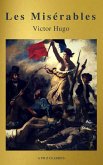Victor Hugo's "Les Misérables" is a monumental work that delves into the moral struggles and societal injustices of 19th-century France. Blending rich characterization with intricate plotting, Hugo employs a lyrical yet accessible narrative style that oscillates between sweeping historical epics and intimate personal stories. Set against the backdrop of revolutionary fervor and existential despair, the novel explores themes of poverty, redemption, and the quest for justice through the lives of characters like Jean Valjean, Javert, and Fantine, thereby reflecting the complexities of human experience. Hugo, a prolific writer and social activist, was driven by his passionate advocacy for humanitarian causes and deep concerns over social inequality. His experiences of exile and personal hardship fueled his commitment to exploring themes of redemption and grace amidst suffering. With "Les Misérables," Hugo not only presents a vivid tapestry of human life but also prompts readers to confront the moral question of how to navigate a world rife with injustice, drawing on his own philosophical and political beliefs. This timeless classic is a must-read for anyone interested in the intersection of literature and social justice. Its enduring relevance and profound insights into the human condition make it not only a compelling narrative but also a vital reflection on the moral imperatives we face today. Readers will find themselves profoundly moved and challenged, making "Les Misérables" an essential part of the literary canon.
Dieser Download kann aus rechtlichen Gründen nur mit Rechnungsadresse in A, B, BG, CY, CZ, D, DK, EW, E, FIN, F, GR, H, IRL, I, LT, L, LR, M, NL, PL, P, R, S, SLO, SK ausgeliefert werden.









